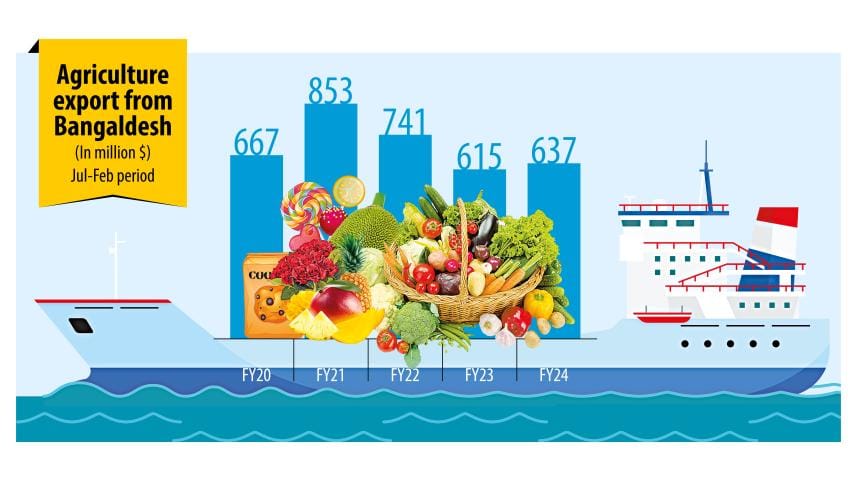Agri product exports make a turnaround

Bangladesh's agricultural product exports have slightly increased year-on-year during this fiscal year, marking a turnaround from a gradually drop over the past three years thanks to, according to industry insiders, restoration of supply chains and a slight improvement in the US dollar crisis.
The export receipts amounted to $637 million in the past eight months, according to the export promotion bureau (EPB).
In comparison, it was $615 million in the same period of the previous fiscal year of 2022-23.
The product list here is comprised of tea, vegetables, tobacco, fruits, spices, dry food, oil seeds, betel leaves, animal or vegetable fats and oils, sugar and sugar confectionery, beverages, spirits and vinegar, oil cake and others.
The market insiders said the exports had peaked in fiscal year 2020-21 before the situation started to deteriorate just four months past the Russia-Ukraine war began in February 2022.
Overall, Bangladesh exports more than 700 agricultural items, including 63 basic processed products, according to Bangladesh Investment Development Authority (BIDA).
The main exports items are frozen fish, shrimp and other frozen food products, tea, spices, fruits including dry fruits and some other processed agricultural products.
The major export destinations include the European Union, the US, the Middle East and the Gulf.
At present, there are 486 manufacturers of processed agricultural products, of whom 241 are exporters while the rest cater to the domestic market.
Bangladesh export cereal grains, frozen fish, processed meat, tea, vegetables, tobacco, flowers, fruits, spices, dry food and other processed agricultural products, including livestock, poultry and fish feed, to over 145 countries, said Kamruzzaman Kamal, marketing director of PRAN-RFL Group.
"Improvements in the availability of shipping line containers and stabilisation of the raw material supply chain are helping to increase export of the agriculture products," he said.
During the past two years, global supply chains faced disruptions and freight costs increased in tune with a global economic crisis, which affected the agribusiness sector in Bangladesh, he noted.
"Besides, we faced challenges in competing in the global market due to price increases of raw materials in the international market as well as appreciation of the US dollar against the local currency," Kamal explained.
Now the situation is getting better, including supply chains regaining stability and an increase in the availability of the US dollar, which is helping to improve the export scenario in the agriculture sector, he said.
Kamal believes the sector would witness robust growth in the coming days, on condition no natural or artificial disaster arises.
Export orders are increasing as the crisis involving raw materials is ebbing, said Musharaf Hossain Bhuiyan, head of marketing at Danish Foods of Partex Star Group.
Besides, the dollar crisis is easing alongside challenges over importing raw materials and more stability can be reached as time goes on, he said.
Against this backdrop, the export scenario involving dry foods, particularly biscuit items, is getting better, he said, citing that the European war had disrupted globally supply chains, including dry and processed food exports from Bangladesh.
The exports had drastically dropped last fiscal year as necessary raw materials could not be imported due to the dollar crisis as well fund shortage of their own, he said.
Bhuiyan also believes that the export growth would continue in the coming days due to the strengthening of the supply chain of raw materials.
One of the reasons for the increase in export volume and earnings is for meeting demand for Ramadan, said Md Iqtadul Hoque, general secretary of Bangladesh Agro-Processors' Association.
"We have seen a huge amount of export of items like vermicelli," he said, adding that Bangladesh also exports traditional frozen snacks such as flat bread, paratha, singara and puri.
Non-resident Bangladeshis abroad and migrant workers mainly in the Middle East are the main consumers of locally produced and processed agricultural products, he said.
Prices of agricultural items have dropped and this has enabled exporters to export more too, Hoque said.
"Our export earnings would have been higher if they had been able to ship fragrant rice in line with orders placed by buyers from abroad," he added.




 For all latest news, follow The Daily Star's Google News channel.
For all latest news, follow The Daily Star's Google News channel. 
Comments